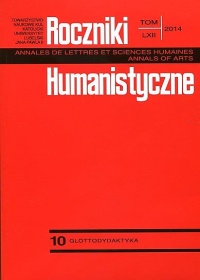Sociolinguistic Factors Influencing the Perception of Non-Native Speech
Abstract
The article presents empirical data on the perception of Polish-accented English by three groups of native listeners from the British Isles (the English, the Irish and the Scottish). The main aim of the study is to explore to what extent informants’ evaluative judgements are conditioned by non-linguistic factors such as age, gender, education, familiarity with Polish-accented English and the frequency of interaction with Poles. The listeners rate the samples of Polish-accented English on two parameters, i.e. foreign accentedness and irritation they evoke. The analysis has revealed that respondents’ age and gender do not influence their judgments (the differences are not statistically significant). Education, prior experience with Polish-accented English and the frequency of interaction with Poles, on the other hand, exert influence on how the speakers are rated.
References
Ben Said, S. (2006): Attitudes towards Accented Speech: A Comparative Study of Native and Non-native Speakers of American English. [M.A. thesis, Southern Illinois University Carbondale, the United States of America] http://www.personal.psu.edu/users/s/b/sbb170/MA%20Thesis.pdf [retrieved August, 2013].
Brodkey, D. (1972): Dictation as a measure of mutual intelligibility: a pilot study, “Language Learning” 22 (2), 203-217.
Cunningham, U. (2008): Acoustic variability in the production of English vowels by native and non-native speakers, in: E. Waniek-Klimczak (ed.), Issues in Accents of English, Cambridge: Cambridge Scholars Publishing, 1-16.
Derwing, T, M.J. Munro and M. Rossiter (2002): Teaching native speakers to listen to foreign-accented speech, “Journal of Multlingual and Multicultural Development” 23, 245-259.
Fayer, J.M. and E. Krasinski (1987): Native and non-native judgments of intelligibility and irritation, “Language Learning” 37 (3), 313-325.
Flege, J.E. (1988): Factors affecting degree of perceived foreign accent in English sentences, “Acoustical Journal of America” 84 (1), 70-79.
Fraser, C. and B. Kelly (2012): Listening between the lines. Social assumptions around foreign accents, “Australian Review of Applied Linguistics” 35 (1), 74-93.
Gass, S. and E.M. Varonis (1982): The comprehensibility of non-native speech, “Studies in Second Language Acquisition” 4 (2), 114-136.
Gonet, W. and G. Pietroń (2004): The Polish tongue in the English ear, in: E. Waniek-Klimczak and W. Sobkowiak (eds.), Zeszyty Naukowe PWSZ w Koninie. Konin: PWSZ, 56-65.
Gynan, S. (1980): Comprehensbility, irritation and error hierarchies, “Hispanica” 68 (1), 160-165.
Lindemann, S. (2010): Who’s ‘unintelligible?’ The perceiver’s role, “Issues in Applied Linguistics” 16 (2), 223-232.
Ludwig, J. (1982): Native-speaker judgments of second language learner’s efforts at communication: a review, “Modern language Journal” 66, 274-283.
Munro, M.J. and T. Derwing (1994): Evaluations of foreign accent in extemporaneous and read material, “Language Testing” 11, 253-266.
Munro, M. J. and T. Derwing (1995): Foreign accent, comprehensibility, and intelligibility in the speech of second language learners, “Language Learning” 45, 73-97.
Munro, M. J. and T. Derwing (2001): Modeling perception of the accentedness and comprehensibility of L2 Speech. The role of speaking rate, “Studies in Second Language Acquisition” 23, 451-468.
Munro, M.J., J.E Flege and I. MacKay (1996): The effects of age on second language learning on the production of English vowels, “Applied Psycholinguistics” 17, 313-334.
Nikolov, M. (2000): The Critical Period Hypothesis reconsidered: Successful adult learners of Hungarian and English, “International Review of Applied Linguistics” 38 (2) 109-124.
Nowacka, M. (2008): Do Students and Native/Non-native Teachers Rate Pronunciation Differently?, in: Robert Kiełtyka, Dorota Osuchowska and Elżbieta Rokosz-Piejko, Language, Literature, Culture and Beyond, Rzeszów: Wydawnictwo Uniwersytetu Rzeszowskiego.
Moyer, A. (2013): Foreign Accent. The Phenomenon of non-native speech, Cambridge: Cambridge University Press.
Majer, J. (2002): “Sick or Seek? Pedagogical Phonology in Teacher Training,” in: Ewa Waniek-Klimczak and Patrick James Melia (eds.), Accents and Speech in Teaching English Phonetics and Phonology, Berlin: Peter Lang.
Piske, T., I. MacKay and J.E. Flege (2001): Factors affecting the degree of foreign accent in an L2: An overview, “Journal of Phonetics” 29, 191-215.
Podberesky, R., R.H. Deluty and S. Feldstein (1990): Evaluations of Spanish- and Oriental-accented English speakers, “Social Behaviour and Personality” 18 (1), 53-63.
Ryan, E.B. (1983): Social psychological mechanisms underlying native speaker evaluations of non-native speech, “Studies in Second Language Acquisition” 5, 148-159.
Schairer, K. (1992): Native speaker reaction to non-native speech, “Modern Language Journal” 76 (3), 309-319.
Sato, K. (1998): Evaluative reactions towards ‘foreign accented’ English speech: The effects of listeners’ experience on their judgements. [M.A. thesis, the University of Alberta, Canada], http://www.collectionscanada.gc.ca/obj/s4/f2/dsk2/ftp04/mq28987.pdf (retrieved June, 2013).
Scheuer, S. (2003): What to teach and what not to teach ? Some reflections on the relative salience of L2 phonetic errors, in: Włodzimierz Sobkowiak and Ewa Waniek-Klimczak (eds.): Zeszyt Naukowy Neofilologii (2), Konin: PWSZ.
Scheuer, S. (2008): Why native speakers are (still) relevant, in: K. Dziubalska-Kołaczyk and J. Przedlacka (eds.), English Pronunciation Models: a Changing Scene: 2nd Edition, Bern: International Academic Publishers, 111-130.
Szpyra-Kozłowska, J. (2005): Intelligibility versus Polish accent in English, “Studia Phonetica Posnaniensia. An International Journal for Linguistic Phonetics” vol. 7, Poznań: Wydawnictwo Naukowe Poznań.
Szpyra-Kozłowska, J. (2013): On the irrelevance of sounds and prosody in foreign-accented speech, in: Ewa Waniek-Klimczak and Linda Shockey (eds.), Teaching and Researching English Accents in Native and Non-native Speakers, Berlin: Springer Berlin Heidelberg.
Tajima, K., R. Port and J. Dalby (1997): Effects of temporal correction on intelligibility of foreign-accented English, “Journal of Phonetics” 25 (1), 1-24.
Thompson, I. (1991): Foreign accents revisited: The English pronunciation of Russian emigrants, “Language Learning” 41 (2), 177-204.
van den Doel, R. (2006): How Friendly are the Natives? An Evaluation of Native-speaker Judgements of Foreign-accented British and American English, Utrecht: Netherlands Graduate School of Linguistics (LOT).
Yuan, J., Y. Y. Jiang and Z. Song (2010): Perception of foreign accent in spontaneous L2 speech. http://www.ling.upenn.edu/~jiahong/publications/c03.pdf (retrieved June, 2013).
Copyright (c) 2014 Roczniki Humanistyczne

This work is licensed under a Creative Commons Attribution-NonCommercial-NoDerivatives 4.0 International License.





